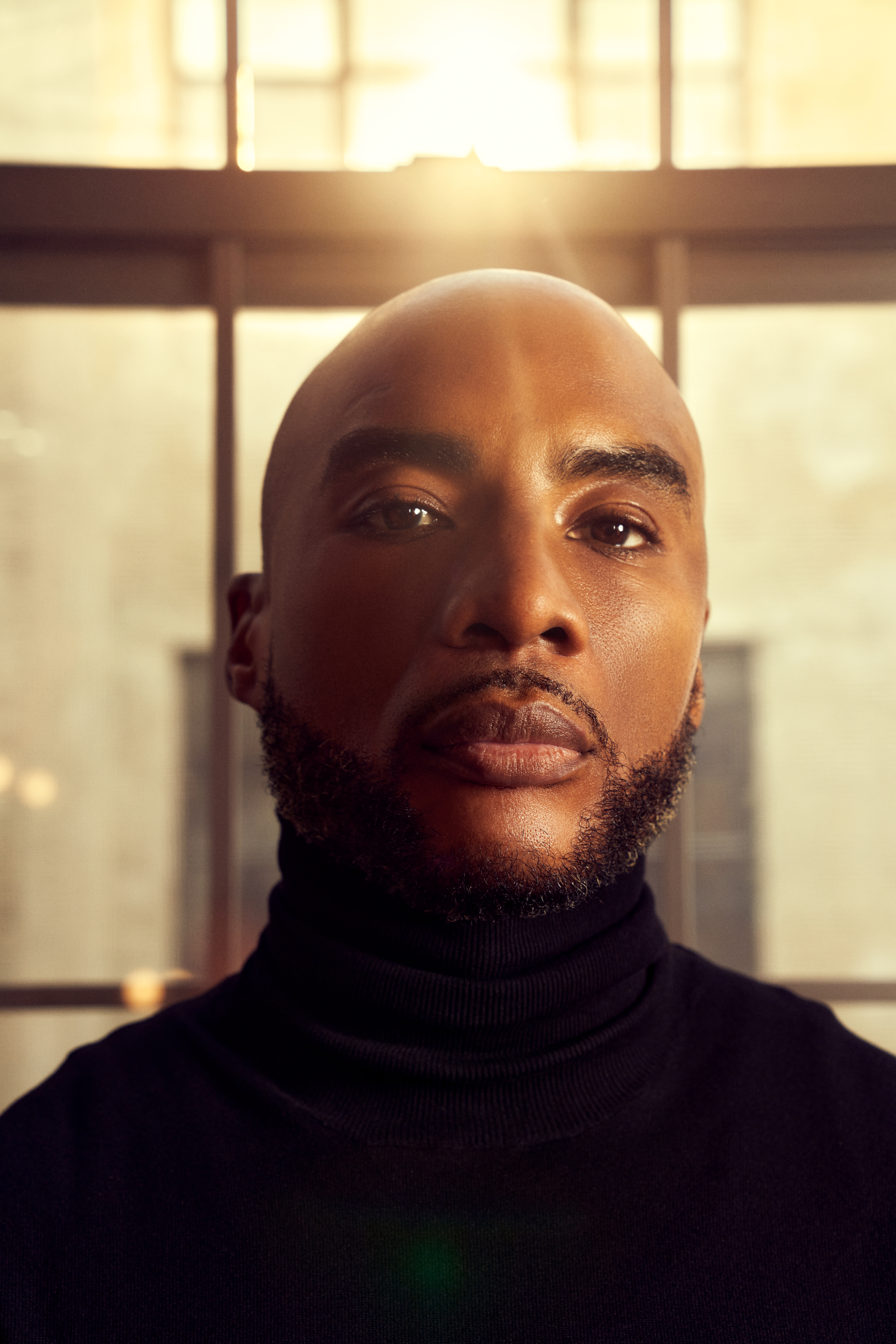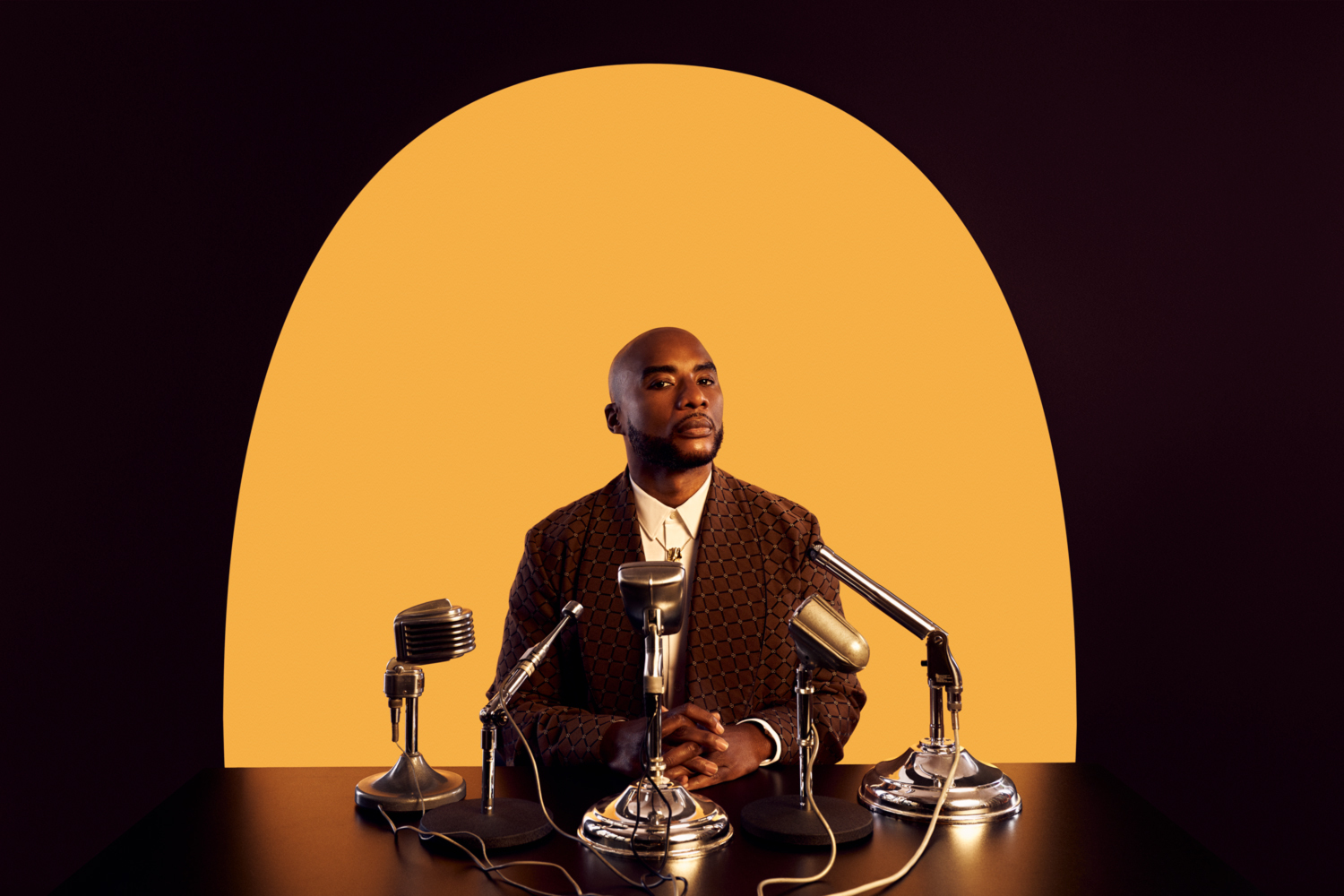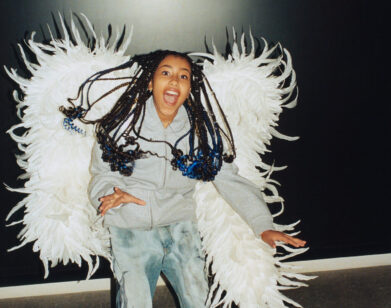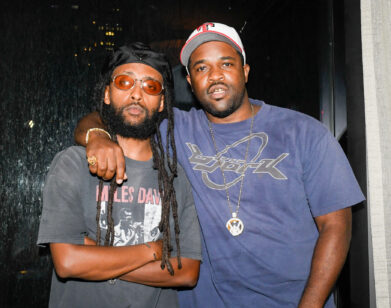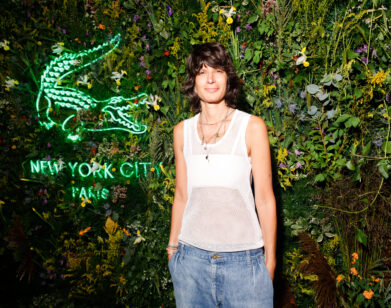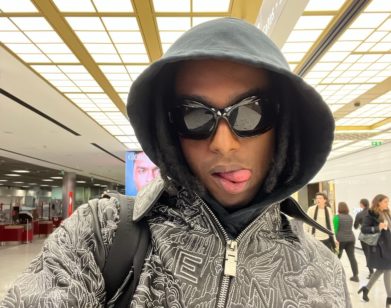ON-AIR
Charlamagne tha God and Stephen Colbert on Where We Are Right Now
“Bite my tongue for no one.” Biggie Smalls said it first, but Charlamagne tha God lives by it. As a cohost of Power 105.1’s syndicated morning show The Breakfast Club, which he has hosted alongside DJ Envy and Angela Yee since 2010, the man born Lenard Larry McKelvey ascended to the top of the airwaves on the strength of his unflinching interviews, from calling out Kanye West’s hypocrisy to confronting Elizabeth Warren’s ancestry. And while he remains as emboldened as ever in front of a microphone, therapy and self-examination have helped soften his approach. Charlamagne’s maturation, detailed in his 2018 book Shook One: Anxiety Playing Tricks on Me, has remade The Breakfast Club, a longtime weather vane of the hip-hop world, into a destination for progressive politicians looking to amplify their message. Now, the South Carolina native is parlaying that influence and reach into his own media company, the Black Effect Podcast Network, and an upcoming talk show on Comedy Central. Ahead of Election Day, he spoke to his friend and fellow host Stephen Colbert about dicks, of both the photographed and elected variety.
———
STEPHEN COLBERT: Charlamagne.
CHARLAMAGNE THA GOD: How are you, brother? How do you like being back in the studio?
COLBERT: It’s weird, man. I got to do the show for five months down in South Carolina, and went through a South Carolina spring, which I hadn’t been able to do since I was in college. Being back in New York, doing the show out of the Ed Sullivan building, I’m dealing with COVID for the first time, in a strange way. There’s me and four other people, and everywhere you look, there are signs saying, “Stay away from everybody.” It’s got a post-apocalyptic feel to it. Have you gone into the studio?
CHARLAMAGNE: We’re not officially back yet.
COLBERT: How has COVID changed the rhythm and chemistry between you guys?
CHARLAMAGNE: I hate it. Radio is such a personal experience. I always say that radio was the original form of social media, because radio was the outlet where listeners could literally contact the host immediately, just by picking up the phone. And even though we still have that element to it, there’s something off.
COLBERT: We talk about micronutrients in our food that we’re not entirely sure about. There are vitamins and nutrients that are macro, but then there are these incredibly important micronutrients. I think we get micronutrients from being around other people.
CHARLAMAGNE: It’s a different energy, and that’s one of the main reasons I’m not in love with social media. It doesn’t feel like a real connection.
COLBERT: Whenever I go on vacation, I delete Twitter right away. I had to go on for about an hour in the middle of my two-week break to tweet something that I had promoised somebody I would, and I felt like blood was coagulating in my chest.
CHARLAMAGNE: Exactly.
COLBERT: Does The Breakfast Club have a mission statement, or a self-imposed mandate that the show wants to achieve on a daily basis?
CHARLAMAGNE: I always say it’s the world’s most dangerous morning show, because when we started, there were moments that people would deem controversial, whether it was rappers coming in yelling and screaming, or guests being asked questions that they wouldn’t be asked anywhere else. And it’s still that way, but I don’t know if “dangerous” is the mission statement. I want to have a show that entertains, educates, inspires, and enlightens.
COLBERT: On my old show The Colbert Report, we had a three-rating system. There was “solid,” meaning we did our jobs; “yay,” meaning it was exceptional; and “wrench to the head,” meaning doing the show felt like a wrench to the head. How often do you achieve what you want to do with your show?
CHARLAMAGNE: If I’m good, then I feel like the show has done what it was supposed to do. But I’m not a good gauge, because something that I think is super interesting or inspiring might be boring to everyone else. You never really know what kind of feedback you’re going to get until later on. And what I mean by that is, I might be in a grocery store a year from now, and somebody will come up to me and mention an interview that I didn’t think was appreciated, but they’ll be like, “Yo, that conversation changed my life.”
COLBERT: You famously will ask anybody anything, and you’ve said that the Biggie Smalls lyric “Bite my tongue for no one” is a mantra for you. Have you ever held your tongue because you weren’t sure whether it was appropriate?
CHARLAMAGNE: That’s changed a lot for me over the years, simply as a result of being in therapy. It pains me when I see people having to go through their healing process in real-time. Sometimes, you don’t owe anybody explanations until you’re ready to give them. At times, it feels like I’m intruding on somebody’s healing process, so in moments where I feel empathy, I won’t ask the question. Or if I do, I’ll ease into it.
COLBERT: Even your most direct and surprising interviews never feel hostile to me. “I’m going to say the thing in the room that no one else will say.” That’s one of your greatest strengths. I think guests look for that because they don’t know how to bring up their own subjects.
CHARLAMAGNE: Absolutely. I want to give humans the grace that I would want god to give me. That’s my model nowadays.
COLBERT: That’s a high standard.
CHARLAMAGNE: If you’re a god-fearing person, even when things don’t go your way, you still know that there’s a higher power involved. I think we’re too judgmental in our society, and I don’t want to be that. I want to be able to ask questions that help people get through whatever it is they’re going through.
COLBERT: What advice would you give to Chris Evans right now?
CHARLAMAGNE: Nothing, because he came out good. He didn’t have no shrinkage. He’s getting rave reviews. People are saying, “That’s America’s penis.” Chris Evans needs to be giving me advice.
COLBERT: I thought he handled it quite well when he tweeted, “Now that I have your attention, go vote.” Have you ever sent pictures of your own penis to somebody else?
CHARLAMAGNE: Never been a dick pic guy.
COLBERT: But you understand it, because you’re much younger than I am. I thought perhaps it was a generational thing. I’ve never done it and I don’t understand it.
CHARLAMAGNE: I don’t understand it, either, but also, our penises don’t look like Chris Evans’s. Well, I can’t speak for you, but if I had one that looked like his, I might be showing it off to people, too. I don’t have a photogenic penis.
COLBERT: It’s an introvert. On the night of the 2016 election, you were on the live show I did for Showtime. What’s your memory of that night?
CHARLAMAGNE: A major letdown, but also, to paraphrase the title of one of Barack Obama’s books, it reminded me of the audacity to have hope. You kind of gave us that when you spoke at the end, because it goes back to what I just said: If you believe in a higher power, you have to know that god is always in control, even when things don’t go your way. I was at the Javits Center before I came to do your show, and I had my oldest daughter with me, because I wanted her to see what I thought was going to be the first woman president of the United States of America. At the time, she was 8. When Hillary lost, she asked me, “How does a guy like him win?” Those were an 8-year-old’s words. And I had no words for her. Zero. That’s why when I came on your show, and the first thing you asked me was how I felt, I was like, “America, y’all fucked this one up.” And guess what? Four years later, no truer words have been spoken. It is really fucked up right now. I don’t care if there’s a Republican or a Democrat in the White House. I just don’t want the country to go to shit.
COLBERT: Some people may not know that you and I are both from South Carolina. Our state motto, which I know you know, is “Dum spiro Spero,” which means—
CHARLAMAGNE: “While I breathe, I hope.”
COLBERT: Inspiration and hope are so important right now. What does that state motto mean to you, especially in the time of the Black Lives Matter tragic battle cry, “I can’t breathe.” If you can’t breathe, can you hope?
CHARLAMAGNE: As long as I’m alive, I have to hope. I’ve been thinking about that lately, because I’ve been having conversations with people from the other side—ancestors, family members, people I’ve lost recently. When Chadwick Boseman passed away, someone said, “Chadwick is going to be an ancestor now.” And it got me thinking that maybe some people can do greater work on the other side by empowering us.
COLBERT: Do you get messages from people who have passed on?
CHARLAMAGNE: Yeah. When I was much younger, I was very clairvoyant. I would always get visited. As you get older, you get jaded about that kind of stuff. There are times when I’m sitting outside, and I think I’m hearing things in my mind. It’s not necessarily a voice, but it’s this message that’s coming to me, and I just know who it is. I’m like, “Oh, that’s Grandma.”
COLBERT: A couple of years after my mother died, I had a dream that I was in Washington, D.C., in the central hall of Union Station. My mom was standing there with my brothers and sisters. I walked up to her and she turned to me, and I said, “Mom, you’re here. I must be dreaming.” And she said, “Good, that’s the only way you’ll stay awake.” I’ve been trying to figure that one out for five years.
CHARLAMAGNE: When I’m asleep, and I’m getting access to these other dimensions, that’s what makes me wake up even more alive, because clearly there’s something else after this.
COLBERT: You talked to Joe Biden a couple of months ago, and you said that you thought he should pick a progressive Black woman as his running mate. Are you happy with Kamala Harris as that choice?
CHARLAMAGNE: Absolutely. That’s who I wanted. I went to five of her campaign stops. She’s a political change agent. Back in 2015, when I was looking to see who was going to be next after President Obama, I said that the Democratic Party was going to have to get Blacker, Browner, younger, and more diverse in gender, and then I came across her. I was intrigued by what she was doing as a prosecutor. She was doing a lot of progressive things. When everybody was questioning her record as a prosecutor, I was confused, because I liked her for the exact opposite reason.
COLBERT: I have the privilege to talk to a lot of politicians, and I rarely feel like I’m getting the real person. The first time I spoke to her, though, I thought, “That’s an actual person talking to me. That’s not a focus-grouped answer. I’m not hearing a slice of a stump speech.” I heard that from Barack Obama, and I had not heard it from another person until she sat down across from me.
CHARLAMAGNE: There are certain things you can’t fake. The first time we interviewed her, we asked who her favorite rapper was, and she said Too Short. Yo, you can’t fake that.
COLBERT: Your Joe Biden interview was back in May. Since you spoke to him, do you think he’s made any strides in supporting what you’ve described as the Black agenda?
CHARLAMAGNE: Not as strongly as he could have, but he’s put out the Lift Every Voice plan, which addresses some things that Black people need right now. I want somebody to have a strong economic Black agenda. But one thing Biden did say is that it’s a livable document, so it’s able to be updated. When thinking about voting for Biden, which I’m going to do, look at the people around him. I look at Senator Harris, I look at Congressman Cedric Richmond. These are people who will keep him engaged in what’s going on with us, because we really need it right now. All the underlying conditions that have been negatively impacting the Black community were exposed because of COVID-19. America was exposed, period. But you know what they say: When America gets a cold, Black America gets the flu.
COLBERT: Tell me about the Black Effect Podcast Network. What do you want that to be?
CHARLAMAGNE: I want it to be to the audio business what BET was to the television business in the ’90s. There’s a reason people still reference BET in regards to Blackness. When it started, it featured so much diverse Black thought. It’s where I first saw Ed Gordon, where I first saw Jacque Reid, where I first saw Ananda Lewis. They were talking about issues that were directly impacting our community, from politics to social justice. BET also had Rap City, so I could see my favorite hip-hop artists who weren’t getting the shine on major networks. That’s what I want the Black Effect Podcast Network to represent, because Black people are not monolithic.
COLBERT: When is your Comedy Central show going to start?
CHARLAMAGNE: Hopefully before the election. It would be fun to add to the parade of voices.
COLBERT: The election is seven weeks from today. That’s awfully fast, man.
CHARLAMAGNE: I would love to get one in. There’s definitely space for Comedy Central to do something where it’s, like, me and Trevor Noah doing something on election night. It would be fun. I just don’t know how fun everything is going to be after November 3rd.
This article appears in the Fall 2020 issue of Interview Magazine. Subscribe here.
———
Grooming: Barry White for Barry White Men’s Grooming
Prop Stylist: Beth Pakradooni
Photography Assistant: Fela Raymond
Fashion Assistant: Nafeesa Baptiste

